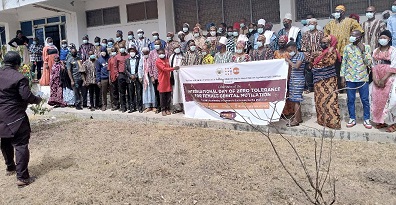
Data from the 2021 Population and Housing Census (PHC 2021) by the Ghana Statistical Service (GSS) has indicated the Upper West Region has topped the chart of regions with prevailing incidents of Female Genital Mutilation (FGM) among women aged 15 to 49 years in the country.
According to Alhaji Mammah Tenii, a Programme Specialist/Head with the United Nations Population Fund (UNFPA) decentralized office in Tamale in the Northern Region,figures from the PHC2021 indicated that FGM prevalence among females from 15 to 49 years was 2.4 percent nationwide with the Upper West Region alone recording 32.5 percent of that figure.
He explained that the region was closely followed by the Upper East with 13.2 per cent and said many of the communities in border towns of the two regions as well as parts of the Bono regions according were notorious for the practice.
Alhaji Tenii stated this on Wednesday at a meeting in Wa on consolidating efforts to end FGM in Ghana. The meeting which was part of activities to mark the International Day of Zero Tolerance against FGM was on the theme “Accelerating Investment to end Female Genital Mutilation”.
He explained that the practice among children aged 0-14 was pegged at one percent for the entire country, and said the alarming figures posed a hindrance to the wellbeing of women in Ghana.
“The tenets of the theme calls for collective efforts to build agile and resilient measures to halt FGM practice in the country as it is recognized globally as a human rights violation that alters or injure the female genitalia for non-medical or non-religious reasons but rather leave the victims with lasting emotional and psychological scars”, he stated.
He explained that the constitution of the country recognized FGM as a crime and said his outfit, the UNFPA had launched diverse programmes to respond to the menace.
“The UNFPA and UNICEF joint programme on the elimination of FGM in northern parts of Ghana to restore the dignity of girls subjected to FGM has among other things,trained key influencers who are victims of FGM to serve as champions and help report perpetrators of the act within their jurisdiction for the laws to deal with them”, he stated.
He intimated that the UNFPA together with the Ministry of Gender, Children and Social Protection also served as safe haven for victims of FGM to report their plight and also access support for psychological recovery.
For her part, the Regional Director at the Department of Gender, Madam Charity Bature highlighted that socially victims of FGM lacked self-confidence and were mostly rendered timid particularly in the midst of their colleagues.
Present at the meeting were traditional authorities from selected districts of the region as well as departmental stakeholders such as the department of children and educationists pledged their role in ensuring that FGM was nipped in the bud.
FROM LYDIA DARLINGTON FORDJOUR, WA







